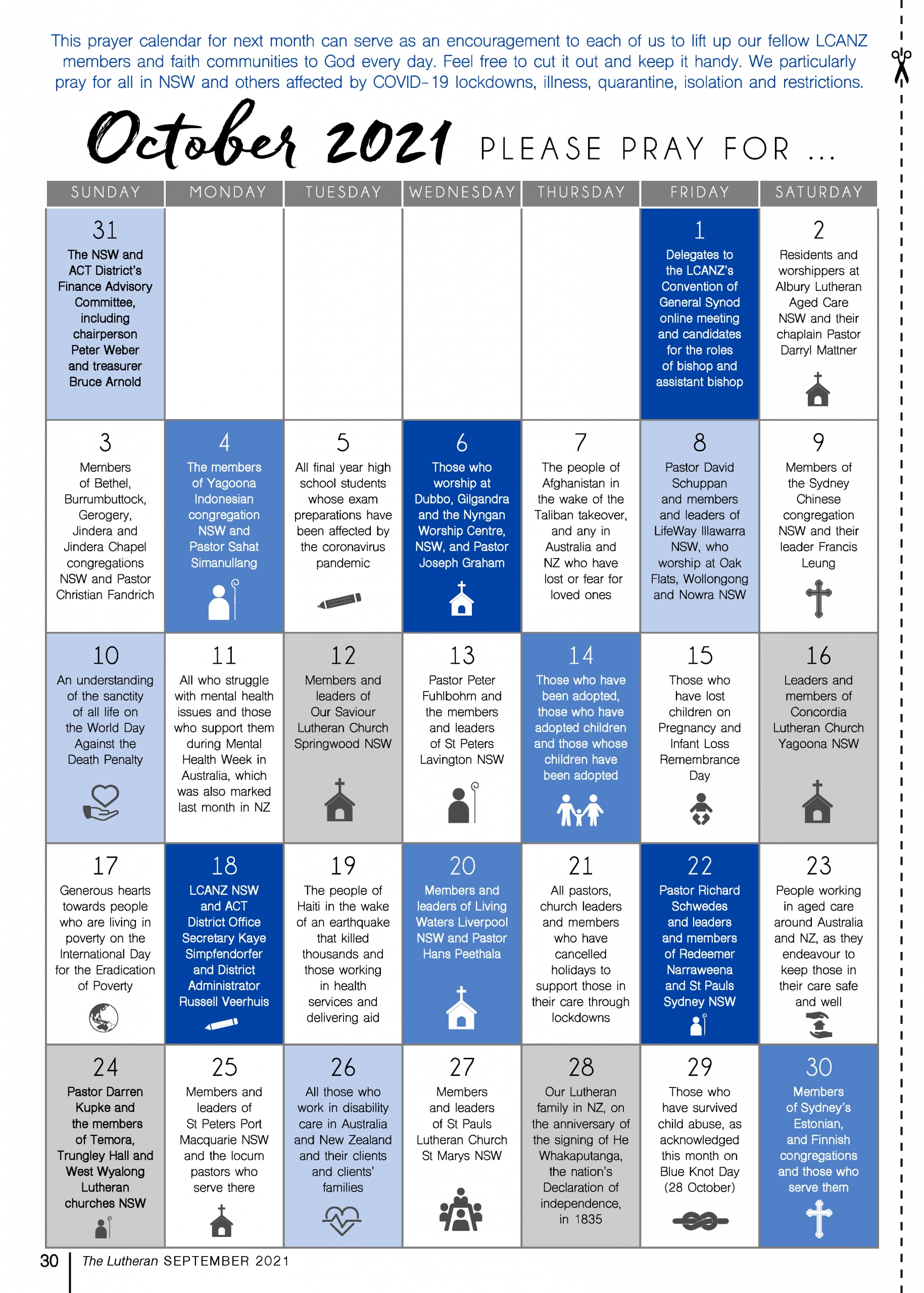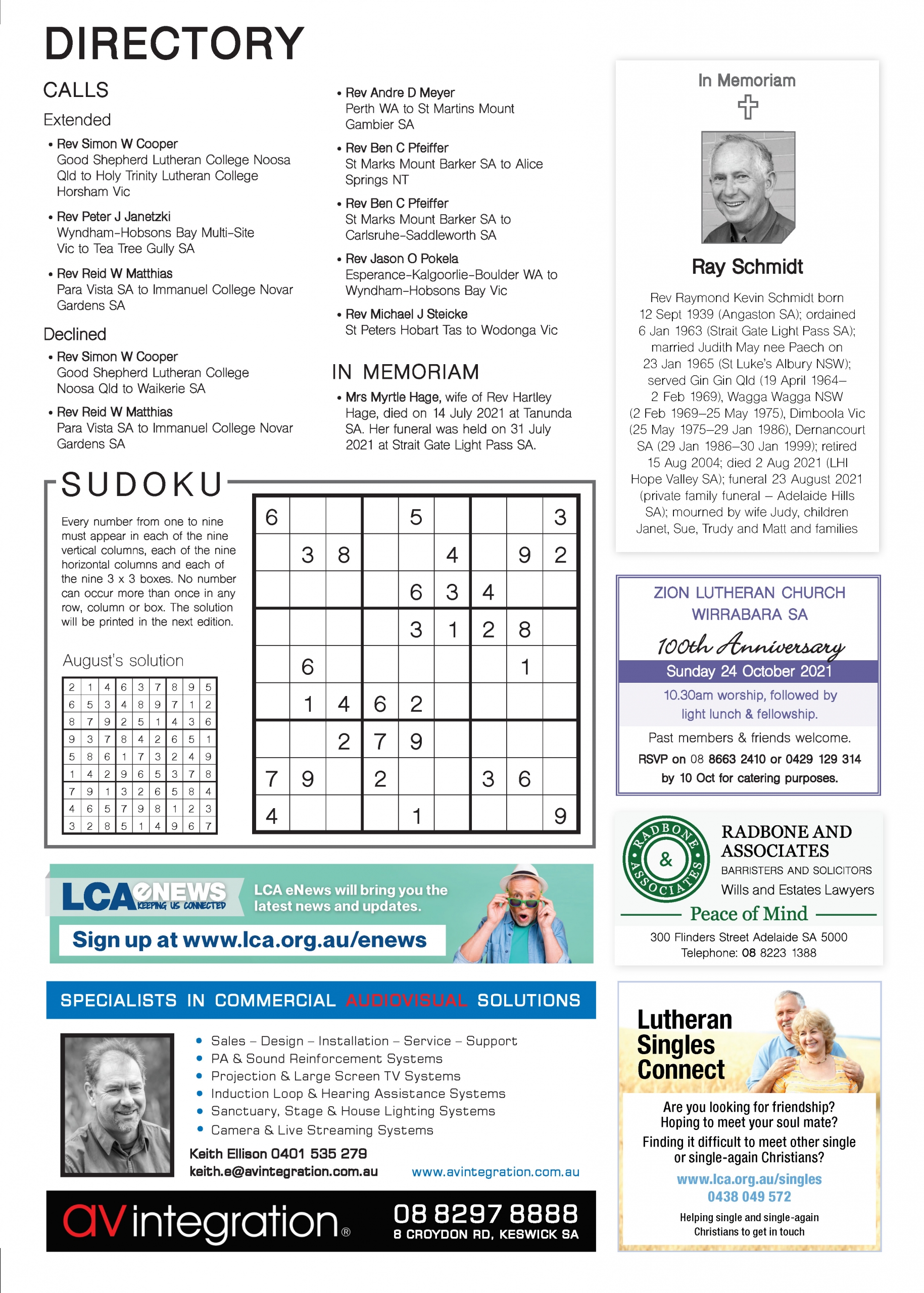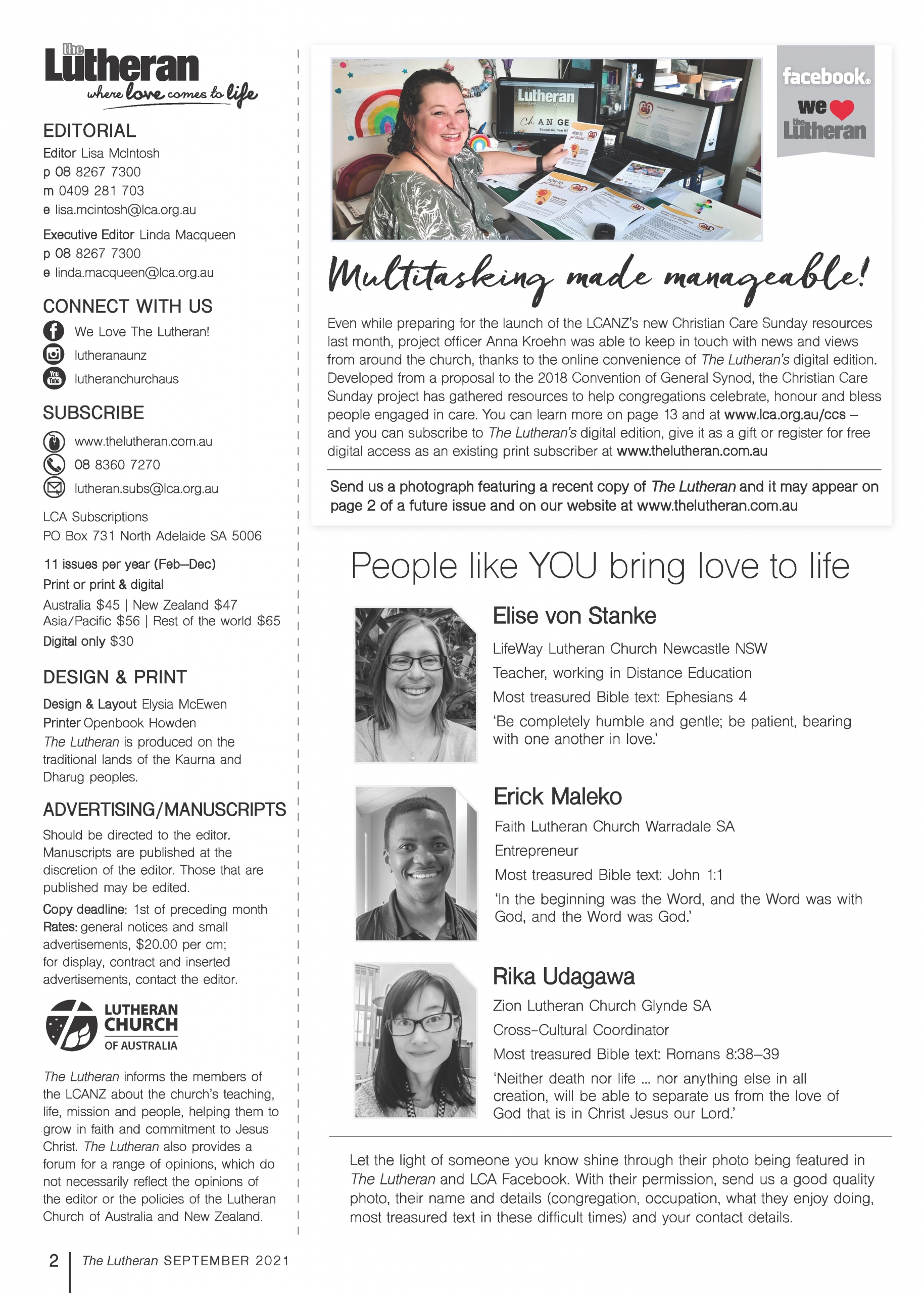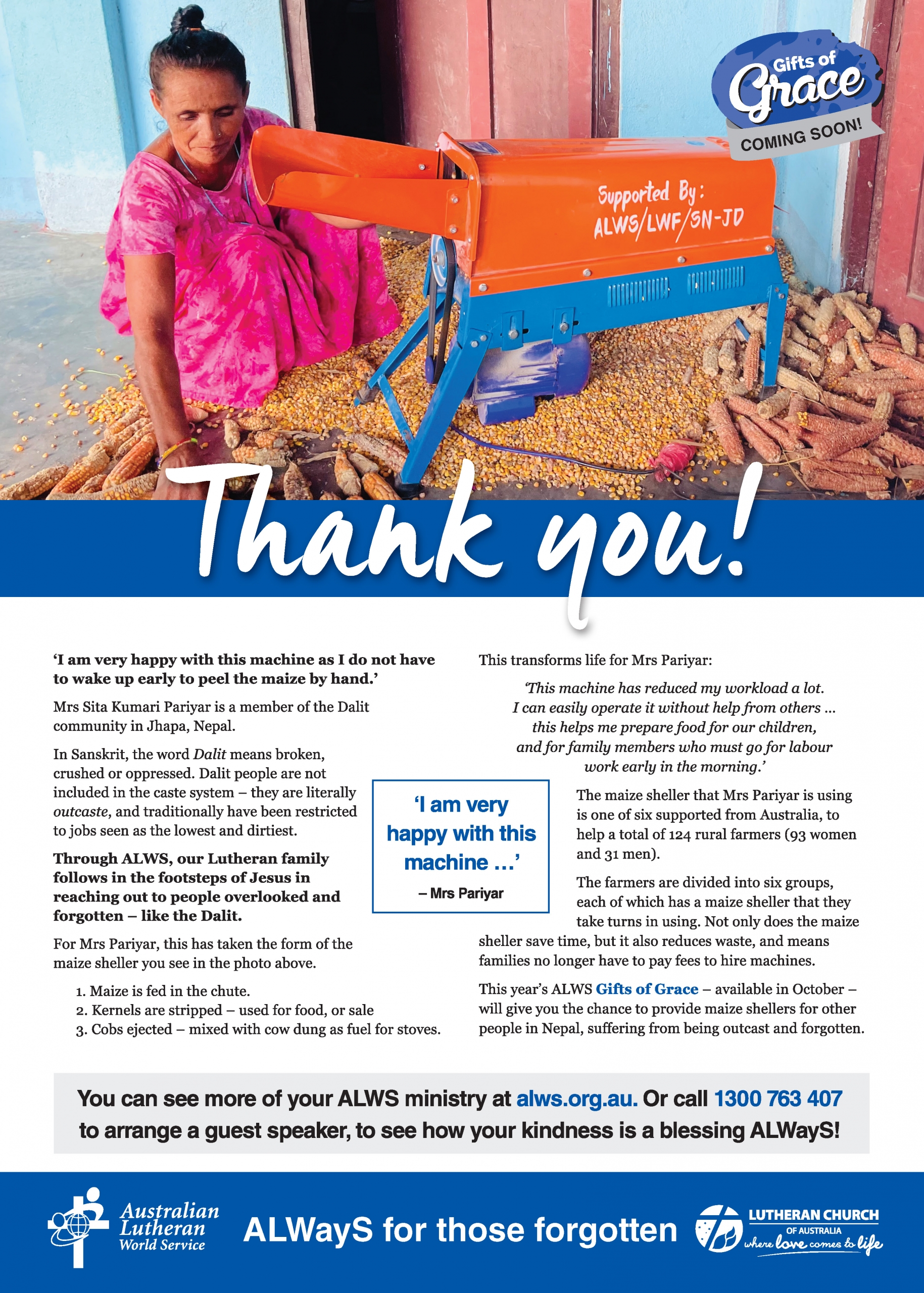CHURCH@HOME www.lca.org.au/churchhome
Resources to strengthen and nurture faith
Regular devotions can be a great foundation for our home-worship life. They can help nurture our faith and even that of our families, as they strengthen our relationship with Jesus, increase our trust in God and our openness to the call of his Spirit. We pray that you will receive blessings from the devotional materials here and in the Church@Home resources collection collated and shared on the special webpage at www.lca.org.au/churchhome. There are also other faith-building and practical resources available through this webpage. If you have internet access and a printer, why not print some and mail or deliver them to those who may otherwise miss out?
– Lisa
Psalm 34:10b
Those who seek the Lord lack no good thing.
DEVOTIONS FOR HOME WORSHIP
These reflections are from a collection of devotions written for our LCANZ family and friends to help us to keep our eyes on Jesus. They can be used by families, small groups and individuals as part of daily faith practice. You can find these and more on the LCA website at www.lca.org.au/daily-devotion
Land of plenty by Colleen Fitzpatrick
‘For the Lord your God is bringing you into a good land’ (Deuteronomy 8:7a).
Read Deuteronomy 8:1–10.
Many of us can trace back to when our family arrived on this good land. They came for a variety of reasons. Some were seeking religious or political freedom; others came for safety or economic security. Many have found it to be a good land indeed.
Before our arrival, the First Nations people nurtured the land and lived well on it. They had looked after the ‘flowing streams with springs and underground waters’. Their needs were simple, and they lacked nothing.
The arrival of European settlers upset the established order. New ways of managing the land were implemented, and the iron and copper and other minerals in the stones and hills were harvested to fill pockets. People ate their fill, but did they remember to bless the Lord for the good land he gave?
The richness of the land has diminished; the rivers and underground waters have been drained, and God’s commandments are no longer guiding the lives of many.
I wonder what God is thinking about us now. We are constantly hearing about extreme weather events and natural disasters – heatwaves, floods, bushfires, mudslides, mouse plagues and, of course, the pandemic. Species of animals and plants are in danger of being lost forever.
On the one hand, some people are earning more and more – eye-watering numbers of dollars which can never be spent. On the other hand, many people do not have enough money to pay for food and shelter.
Rather than wallow in a sea of depression and pessimism, let’s be positive! We can walk gently on the earth, and if we each do our bit to be good stewards of the earth, we can make a difference. And as we do that, let’s bless the Lord our God for bringing us to this good land while remembering that it is God’s good land – not ours.
Creator God, you made the world and all that is in it, and you saw that it was good. Forgive us for when we have taken the land for granted and have used it to serve our own purposes. Help us to be better caretakers so that it is sustained into the future. Amen.
Direct access by Verena Johnson
‘Let us not hear the voice of the Lord our God nor see this great fire anymore, or we will die’ (Deuteronomy 18:16b).
Read Deuteronomy 18:15–22.
How sad that the Israelites did not want to hear from God directly or see the fire of his great presence because of their fear.
They asked for a mediator to stand between them and God. As a result of their request, they had a whole series of mediators throughout their history, starting with Moses and followed by a stream of prophets, priests, judges and kings. The Israelites did not listen to God themselves; they relied on ‘mediators’ to tell them what God said.
Many of these ‘mediators’ honoured God, listened to him and spoke the words he put in their mouths, even though the people didn’t always listen or like what they had to say.
However, many more did not. They spoke words in God’s name that he hadn’t said, or even worse, they spoke things in the name of other gods. They often said what people wanted to hear rather than what people needed to hear. This is where the whole arrangement went downhill.
Thank God that Jesus came as the ultimate mediator between God and us and gave his life so we could have direct access to God again.
We don’t have to rely on mediators anymore. We can speak to God directly and hear what he has to say to us any time we want. We can read his word and listen to the Holy Spirit as he speaks into our hearts and lives. We can talk with God in prayer and listen to what he has to say to us.
God wants us to be with him with no-one else between us. He invites us into a close and intimate one-on-one relationship with him.
The problem is people haven’t changed. We are no different to the Israelites. Sometimes our fears get in the way of our relationship with God, and we don’t always listen to or like what he has to say.
But he is always there, loving us, forgiving us, inviting us and calling us to be with him. He has so much he wants to say to us if only we are listening.
Loving God, thank you for inviting us into an intimate relationship with you. Open our spiritual ears to hear you when you speak to us. Open our hearts and minds to receive what you have to say to us. Amen.
PRAYER
A Mourner’s Prayer
Lord God,
Without your promise
I could not endure this sorrow.
Only the promise of your presence
Enables me to carry on in these lonely times.
Only your grace preserves me as I mourn.
Do not let me mourn without hope!
You have taken care of me in the past,
Now let me be carried in your mercy.
Give me the grace to come to you,
And find rest for my soul.
In Christ’s name.
Amen.
– Adapted from the Lutheran Book
of Prayer (1951), from justprayer.org
2 Thessalonians 3:3
But the Lord is faithful, and he will strengthen and protect you from the evil one.
Generosity instead of greed by Pastor Peter Bean
‘Then Jesus said to them, “Be careful and guard against all kinds of greed. Life is not measured by how much one owns”’ (Luke 12:15).
Read Luke 12:13–21.
We might not say we are greedy, but it seems that greed can be present in all sorts of ways.
While money or possessions may be the obvious culprits, greed can spill across into other areas. It is good to examine our conscience in all areas.
If we find we are greedy in any area, what should we do? The obvious is to confess and change our ways. But if I may be so bold, I would like to suggest that the best way to overcome greed is to be generous! In fact, be over-generous.
I might be even bolder and say that most reading this could say, ‘I have enough good things stored to last for many years’ (verse 19). (There will be exceptions; I acknowledge that. If you are struggling, seek help through financial counsellors or similar.) But the reality is, most of us have enough and more than enough.
Years ago, in a poem titled ‘Enough’, I wrote these words:
When we who have too much
Recognise enough is enough
Maybe those who have too little
Will edge closer
Towards our enough.
Our generosity enables others to live. It expands our hearts. It responds to the generous and loving God revealed throughout Scripture. By being generous, we live in the image of God. By being generous, we have life. We can enjoy it abundantly and enable others to have life (in what to them is probably abundance).
The antidote to greed, excessive wealth and too many possessions is living in the grace of our generous God and sharing that grace in whatever way we can.
Generous One, I thank you for all that you give me. Help me to reflect your generous heart in all I do and have. Amen.
Do we underestimate God? by Pastor Glenn Crouch
‘“The days are coming”, declares the Lord, “when I will fulfil the good promise I made to the people of Israel and Judah”’ (Jeremiah 33:14).
Read Jeremiah 33:14–18.
In this passage, Jeremiah looks forward to the coming of our Lord Jesus – Israel’s promised Messiah. The prophet tells us that this is God’s promise, his plan for the salvation of Israel. In this, we see how great is our God – his blessings not only come to Israel but overflow to the whole world. Yes, Jesus, the son of David, will fulfil this promise, but we also see so much more revealed at the end of verse 16, ‘The Lord Our Righteous Saviour’. The Messiah will be the salvation of the world!
Do you underestimate the Lord God? Is his arm too short to reach you? Is he unable to hear you? To see you? No! Our God is one who blesses so greatly that the blessings overflow.
In Jeremiah’s time, what was left of Israel – the people of Judah – was taken by Babylon. The kingship was lost. Jerusalem was lost. The temple was destroyed. Israel (like us) had not been faithful. But we see here that God promises restoration; he promises salvation. Not because Israel deserves it, but because he is gracious. He is so gracious that the Messiah who will save Israel also saves you and me! The Messiah is our Lord Jesus, who saves us through his death and resurrection!
We often feel when things go so horribly wrong that God has abandoned us.
Scripture shows us that while we may move away from him, he doesn’t give up on us. It is easy to grab hold of our righteous Saviour when we realise that he has already got us firmly in his grasp.
Gracious God, thank you for never giving up on me. Thank you for sending your dear Son to live, die and rise again for me. Help me to see that you are with me – in the bad times and the good times. Amem.







